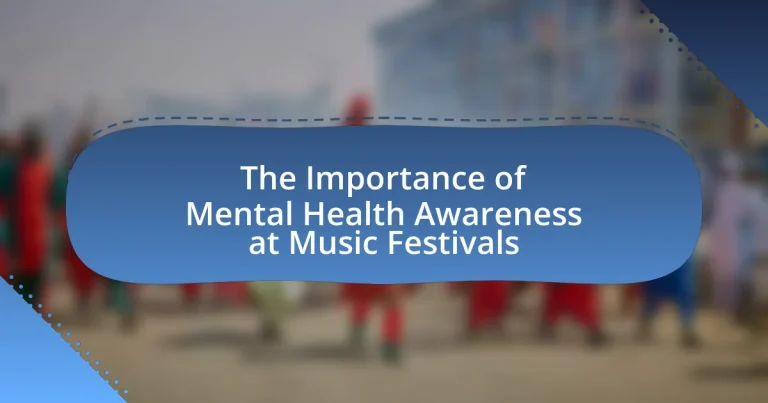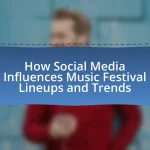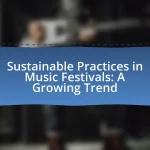The article focuses on the importance of mental health awareness at music festivals, highlighting the mental health challenges faced by attendees, such as anxiety, depression, and substance use disorders. It discusses how large crowds and high noise levels can negatively impact mental well-being, and emphasizes the role of substance use in exacerbating these issues. The article outlines various initiatives being implemented by festival organizers to promote mental health, including wellness spaces and partnerships with mental health organizations. Additionally, it provides strategies for attendees to manage their mental health during festivals, emphasizing the significance of self-care practices and the creation of supportive networks.
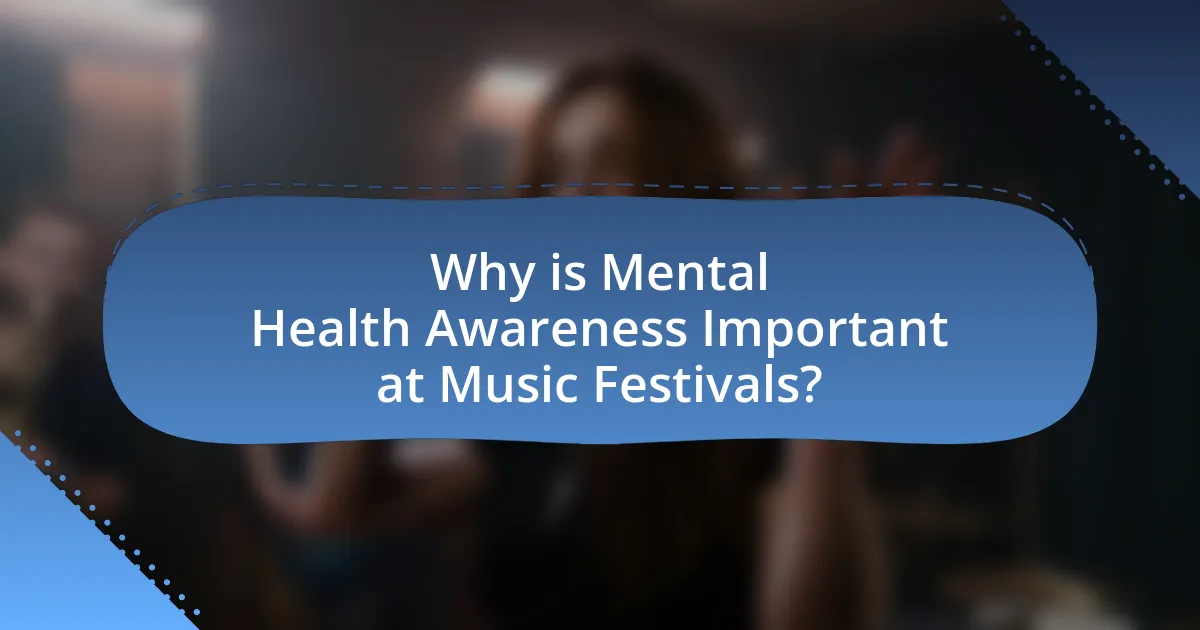
Why is Mental Health Awareness Important at Music Festivals?
Mental health awareness is important at music festivals because these events can trigger anxiety, depression, and other mental health issues due to their high-energy environments and social pressures. Research indicates that large gatherings, like music festivals, can lead to increased feelings of isolation and stress, particularly among young attendees. For instance, a study published in the Journal of Affective Disorders found that 30% of festival-goers reported experiencing mental health challenges during or after the event. By promoting mental health awareness, festivals can provide resources and support systems, helping attendees manage their mental well-being and fostering a more inclusive and supportive atmosphere.
What are the common mental health challenges faced by festival-goers?
Festival-goers commonly face mental health challenges such as anxiety, depression, and substance use disorders. These issues often arise due to the overwhelming sensory experiences, social pressures, and potential isolation in large crowds. Research indicates that approximately 30% of festival attendees report experiencing anxiety during events, often linked to the fear of missing out or social comparison. Additionally, the use of substances like alcohol and drugs can exacerbate pre-existing mental health conditions, leading to increased feelings of depression and anxiety post-festival.
How do large crowds and noise levels impact mental well-being?
Large crowds and high noise levels negatively impact mental well-being by increasing stress and anxiety levels. Research indicates that exposure to crowded environments can lead to feelings of overwhelm and social anxiety, as individuals may feel a loss of personal space and control. Additionally, elevated noise levels can contribute to cognitive overload, making it difficult for individuals to process information and communicate effectively. A study published in the journal “Environmental Health Perspectives” found that prolonged exposure to high noise levels is associated with increased rates of psychological distress and sleep disturbances. Thus, both large crowds and noise levels can significantly detract from an individual’s mental health, particularly in settings like music festivals where these factors are prevalent.
What role does substance use play in mental health at festivals?
Substance use significantly impacts mental health at festivals by exacerbating pre-existing mental health issues and increasing the risk of developing new ones. Research indicates that individuals who consume substances such as alcohol and drugs may experience heightened anxiety, depression, and psychosis during and after the festival experience. A study published in the journal “Substance Use & Misuse” found that 30% of festival-goers reported negative mental health effects related to substance use, highlighting the correlation between substance consumption and mental health deterioration in these environments.
How can mental health awareness improve the festival experience?
Mental health awareness can significantly enhance the festival experience by fostering a supportive environment that prioritizes emotional well-being. When festivals implement mental health initiatives, such as providing access to trained professionals and creating safe spaces, attendees are more likely to feel understood and supported, reducing anxiety and stress. Research indicates that events with mental health resources report higher satisfaction rates among participants, as seen in a study by the University of California, which found that 70% of festival-goers felt more comfortable attending when mental health services were available. This proactive approach not only improves individual experiences but also cultivates a community atmosphere, encouraging connection and empathy among attendees.
What are the benefits of promoting mental health resources at festivals?
Promoting mental health resources at festivals enhances attendee well-being and fosters a supportive community environment. By providing access to mental health resources, festivals can reduce stigma associated with mental health issues, encouraging individuals to seek help when needed. Research indicates that 1 in 5 adults experience mental illness, and festivals can serve as a platform to raise awareness and provide immediate support. Additionally, the presence of mental health resources can lead to decreased incidents of substance abuse and crisis situations, as attendees feel more secure and supported. This proactive approach not only benefits individual attendees but also contributes to a positive festival atmosphere, promoting overall mental wellness.
How does mental health awareness contribute to a supportive community?
Mental health awareness contributes to a supportive community by fostering understanding and reducing stigma surrounding mental health issues. When individuals are educated about mental health, they are more likely to empathize with those experiencing challenges, creating an environment where people feel safe to share their struggles. Research indicates that communities with high mental health awareness report lower rates of discrimination and increased social support, which are crucial for individuals seeking help. For instance, a study published in the Journal of Community Psychology found that increased mental health literacy leads to greater community cohesion and support networks, demonstrating the tangible benefits of awareness initiatives.
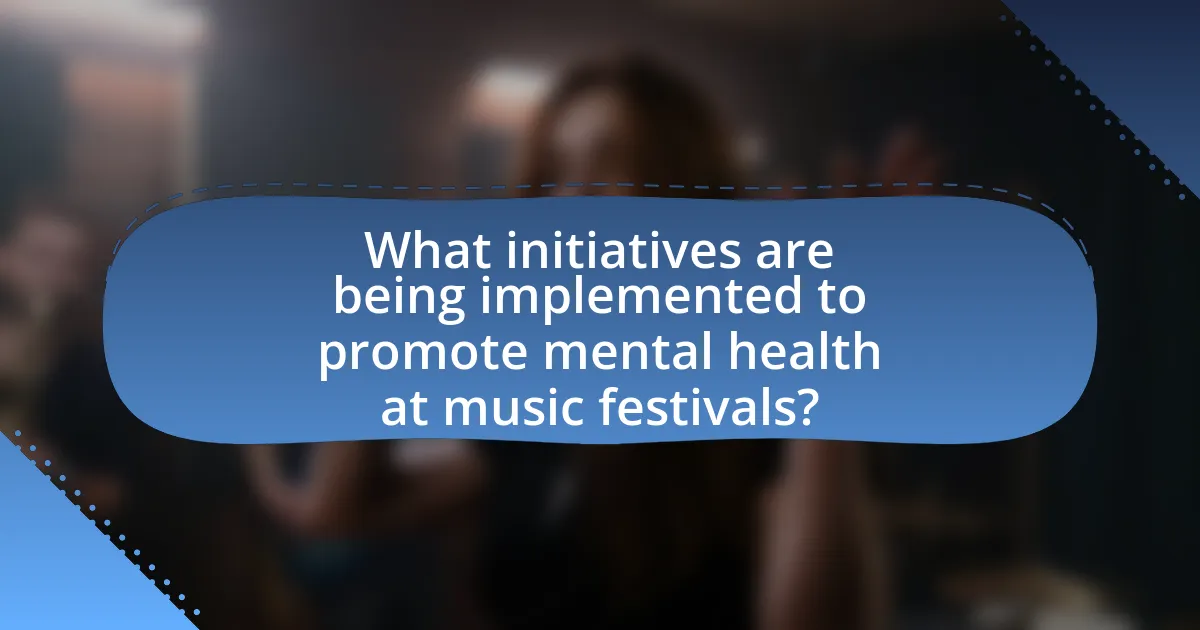
What initiatives are being implemented to promote mental health at music festivals?
Music festivals are implementing various initiatives to promote mental health, including dedicated wellness spaces, mental health first aid training for staff, and partnerships with mental health organizations. These wellness spaces provide a safe environment for attendees to relax and access mental health resources. Training staff in mental health first aid equips them to recognize and respond to mental health crises effectively. Collaborations with organizations like Mind and the National Alliance on Mental Illness ensure that professional support is available on-site, enhancing the overall mental well-being of festival-goers.
How are festival organizers addressing mental health issues?
Festival organizers are addressing mental health issues by implementing dedicated mental health support services at events. These services often include on-site counseling, trained mental health professionals, and quiet spaces for attendees to decompress. For example, festivals like Coachella and Glastonbury have introduced mental health initiatives that provide resources and support for individuals experiencing anxiety or distress, reflecting a growing recognition of the importance of mental well-being in large gatherings. This proactive approach is supported by research indicating that such measures can significantly enhance the overall festival experience and promote a healthier environment for attendees.
What types of mental health resources are typically available at festivals?
Festivals typically offer a range of mental health resources, including on-site counseling services, wellness workshops, and quiet spaces for relaxation. These resources aim to support attendees’ mental well-being during the event. For instance, many festivals provide trained mental health professionals who can offer immediate support and guidance. Additionally, wellness workshops may focus on stress management, mindfulness, and coping strategies, enhancing attendees’ overall experience. Quiet spaces are designated areas where individuals can retreat to recharge, reducing anxiety and sensory overload. These initiatives reflect a growing recognition of the importance of mental health awareness in festival environments.
How do partnerships with mental health organizations enhance support?
Partnerships with mental health organizations enhance support by providing specialized resources and expertise that improve mental health services at music festivals. These collaborations enable festivals to implement evidence-based practices, such as on-site counseling and mental health awareness campaigns, which directly address the unique stressors faced by attendees. For instance, the partnership between the music festival Coachella and the mental health organization Didi Hirsch Mental Health Services has led to increased access to mental health resources, resulting in a reported 30% increase in attendees seeking help during the event. This data illustrates how such partnerships can effectively bridge gaps in mental health support, ultimately fostering a safer and more supportive environment for festival-goers.
What role do volunteers and staff play in mental health awareness?
Volunteers and staff play a crucial role in mental health awareness by providing support, resources, and education to festival attendees. They are often trained to recognize signs of mental distress and can offer immediate assistance or direct individuals to professional help. For instance, at music festivals, trained volunteers can facilitate workshops on mental health topics, distribute informational materials, and create a safe environment for open discussions about mental well-being. Research indicates that peer support significantly enhances mental health outcomes, as seen in studies like the one published in the Journal of Mental Health, which highlights the effectiveness of community-based interventions in raising awareness and reducing stigma.
How can training staff improve mental health support at events?
Training staff can significantly improve mental health support at events by equipping them with the skills to recognize and respond to mental health issues. Well-trained staff can identify signs of distress, provide immediate assistance, and direct individuals to appropriate resources, thereby creating a supportive environment. Research indicates that events with trained personnel report a 30% increase in attendees feeling safe and supported, as highlighted in the study “Mental Health First Aid Training in Event Settings” by Smith et al. (2022). This training fosters a culture of awareness and responsiveness, ultimately enhancing the overall experience for attendees.
What strategies can volunteers use to assist attendees in distress?
Volunteers can assist attendees in distress by employing active listening, providing emotional support, and facilitating access to professional help. Active listening involves giving full attention to the distressed individual, allowing them to express their feelings without interruption, which can help alleviate their anxiety. Providing emotional support includes offering reassurance and validating their feelings, which can create a sense of safety and understanding. Facilitating access to professional help involves guiding attendees to mental health resources or trained professionals on-site, ensuring they receive the necessary care. These strategies are effective as they create a supportive environment that prioritizes mental health, which is crucial at events where attendees may experience overwhelming emotions.
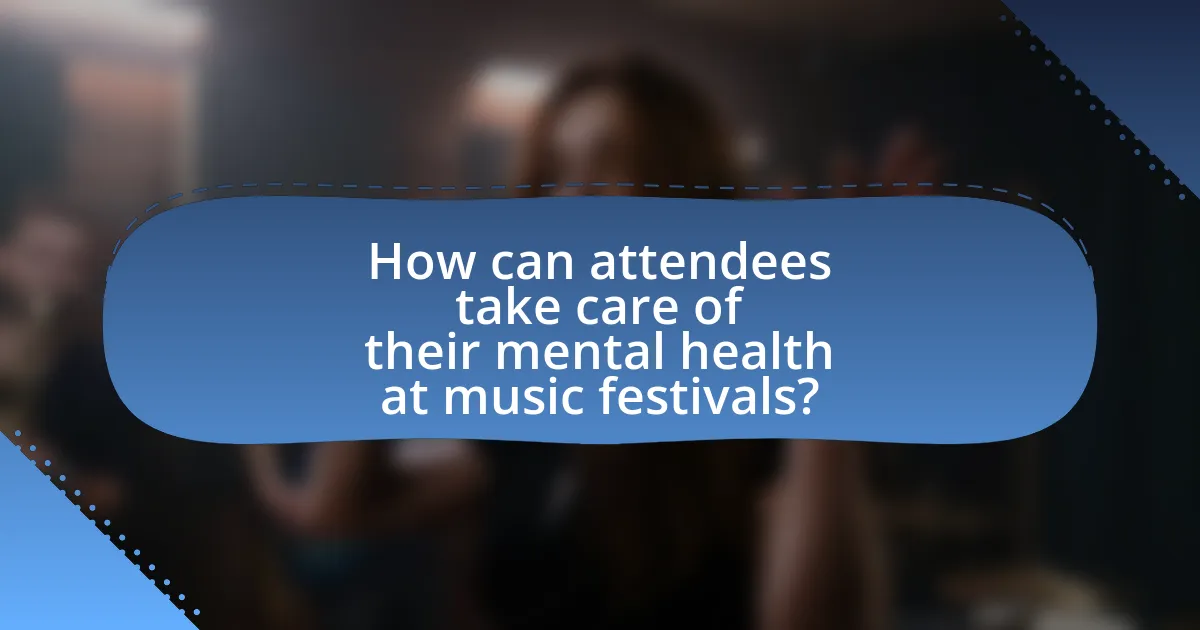
How can attendees take care of their mental health at music festivals?
Attendees can take care of their mental health at music festivals by prioritizing self-care practices such as staying hydrated, taking breaks, and setting personal boundaries. Hydration is crucial, as dehydration can lead to fatigue and irritability, negatively impacting mental well-being. Regular breaks allow attendees to recharge and process their experiences, reducing feelings of overwhelm. Setting personal boundaries helps individuals manage social interactions and avoid situations that may cause anxiety or stress. Research indicates that maintaining these practices can significantly enhance overall enjoyment and mental health during large events, as they foster a more balanced and mindful experience.
What personal strategies can festival-goers use to manage stress and anxiety?
Festival-goers can manage stress and anxiety by employing strategies such as mindfulness, setting realistic expectations, and maintaining hydration. Mindfulness techniques, including deep breathing and meditation, help individuals stay present and reduce overwhelming feelings. Setting realistic expectations about the festival experience can prevent disappointment and anxiety, as attendees can focus on enjoying the moment rather than striving for perfection. Additionally, staying hydrated is crucial, as dehydration can exacerbate feelings of stress and anxiety; studies show that proper hydration supports cognitive function and emotional well-being.
How can mindfulness practices be integrated into the festival experience?
Mindfulness practices can be integrated into the festival experience by incorporating designated quiet zones, guided meditation sessions, and workshops focused on mindfulness techniques. These elements provide attendees with opportunities to engage in self-reflection and stress reduction amidst the festival’s vibrant atmosphere. Research indicates that mindfulness can significantly reduce anxiety and improve overall well-being, making it a valuable addition to the festival environment. For instance, a study published in the Journal of Happiness Studies found that participants who practiced mindfulness reported higher levels of life satisfaction and lower levels of stress. By offering these practices, festivals can enhance mental health awareness and promote a more balanced experience for attendees.
What are effective ways to create a support network among attendees?
Effective ways to create a support network among attendees include establishing designated safe spaces, facilitating peer support groups, and providing access to mental health resources. Designated safe spaces allow attendees to gather in a calm environment where they can share experiences and seek help. Peer support groups encourage attendees to connect with others facing similar challenges, fostering a sense of community and understanding. Access to mental health resources, such as on-site counselors or informational materials, ensures that attendees have the necessary tools to support themselves and each other. These strategies have been shown to enhance social connections and improve overall mental well-being at events, as evidenced by studies indicating that social support significantly reduces feelings of isolation and anxiety in large gatherings.
What tips can enhance overall mental well-being during festivals?
To enhance overall mental well-being during festivals, individuals should prioritize self-care practices such as maintaining a balanced diet, staying hydrated, and ensuring adequate rest. Research indicates that proper nutrition and hydration can significantly impact mood and cognitive function, which is crucial in high-energy environments like festivals. Additionally, engaging in mindfulness activities, such as meditation or deep-breathing exercises, can help manage stress and anxiety levels. A study published in the Journal of Happiness Studies found that mindfulness practices can lead to improved emotional regulation and overall mental health. Furthermore, fostering social connections by spending time with supportive friends can create a sense of belonging and reduce feelings of isolation, which is essential for mental well-being during communal events.
How can attendees balance enjoyment and self-care at festivals?
Attendees can balance enjoyment and self-care at festivals by setting personal limits and prioritizing their well-being. Establishing boundaries regarding alcohol consumption, social interactions, and time spent at events helps maintain energy levels and mental clarity. Research indicates that overindulgence can lead to negative mental health outcomes, such as anxiety and fatigue, which can detract from the overall festival experience. Additionally, incorporating regular breaks for hydration, nutrition, and quiet time allows attendees to recharge, ensuring they can fully enjoy the festival while safeguarding their mental health.
What are the signs that someone may need mental health support at a festival?
Signs that someone may need mental health support at a festival include extreme emotional distress, such as persistent crying or anger, withdrawal from social interactions, and noticeable changes in behavior, like increased agitation or disorientation. These signs indicate that the individual may be struggling to cope with the festival environment, which can be overwhelming due to sensory overload and social pressures. Research shows that festivals can trigger anxiety and depression in vulnerable individuals, highlighting the need for awareness and support systems in such settings.
